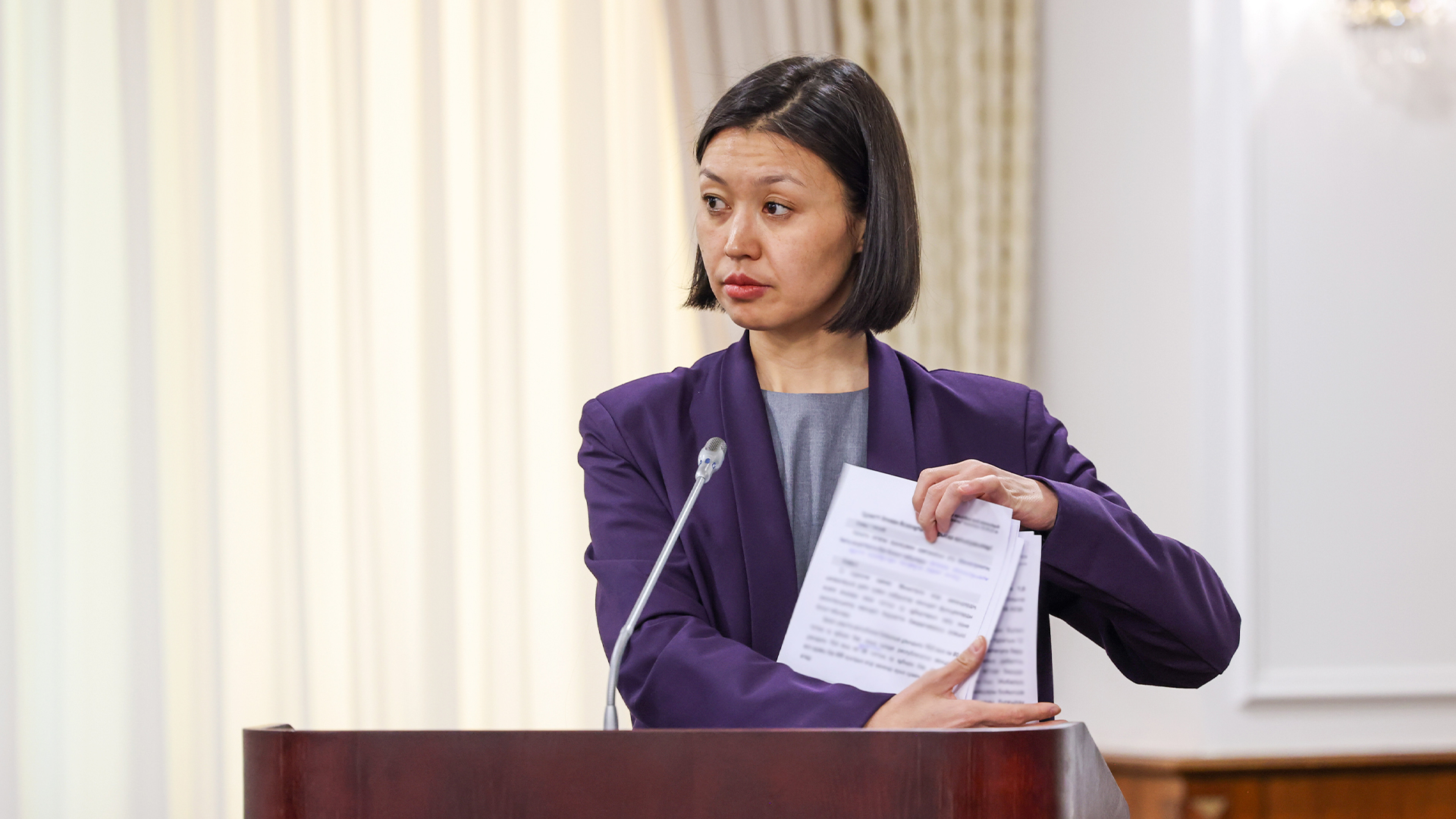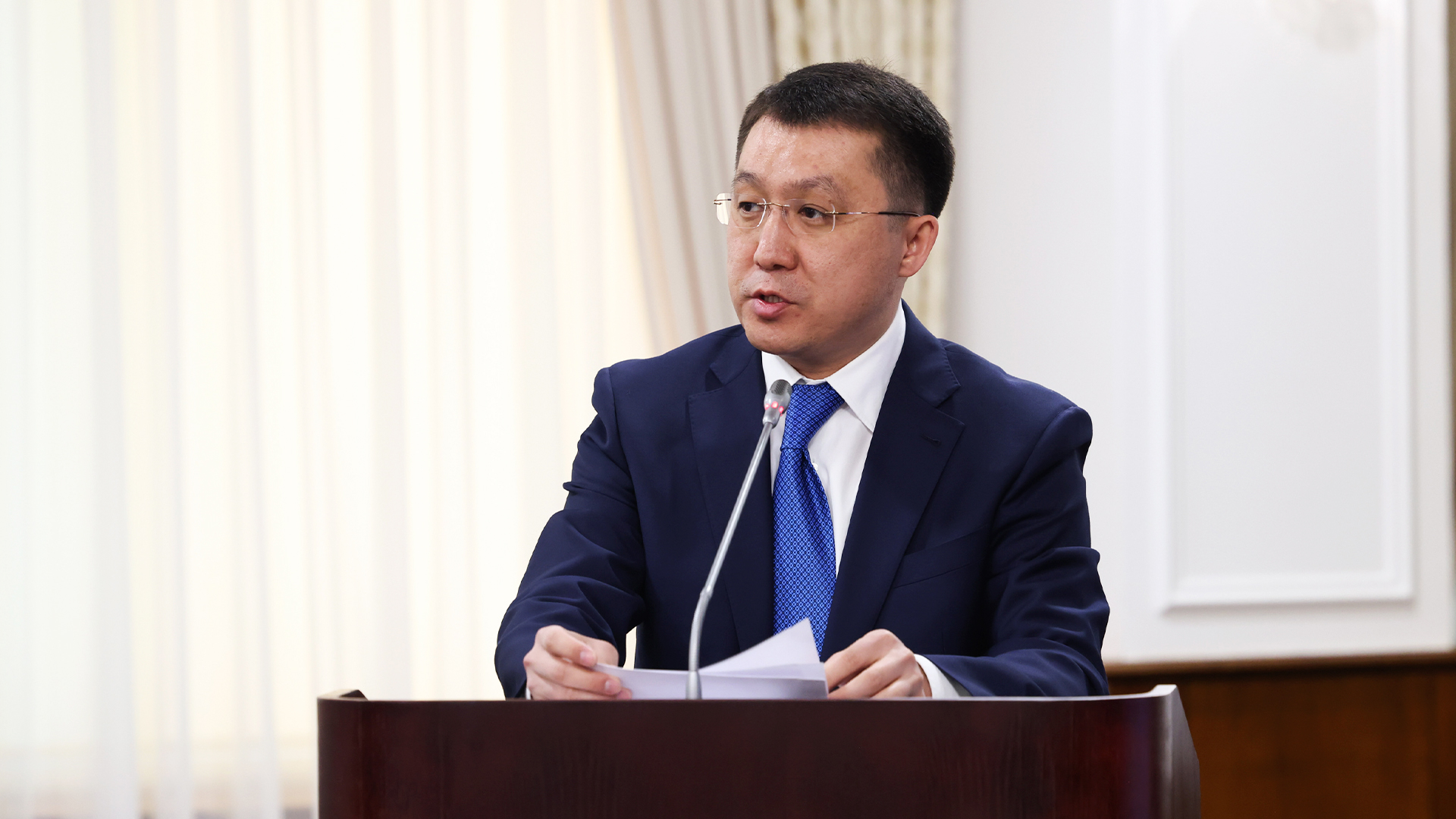02 May 2023, 15:14
 The task to provide 100% access to quality drinking water by the end of 2025 is facing the Government of Kazakhstan. The heads of the Ministries of Industry and Infrastructural Development Marat Karabayev and Ecology and Natural Resources Zulfiya Suleimenova reported on the measures planned to achieve this goal at the meeting of the Government.
The task to provide 100% access to quality drinking water by the end of 2025 is facing the Government of Kazakhstan. The heads of the Ministries of Industry and Infrastructural Development Marat Karabayev and Ecology and Natural Resources Zulfiya Suleimenova reported on the measures planned to achieve this goal at the meeting of the Government.
 The first to report was Minister of Industry and Infrastructural Development Marat Karabayev.
The first to report was Minister of Industry and Infrastructural Development Marat Karabayev.
"According to the results of 2022, access to water services in the cities was 98.4%, in rural areas it was 94.5%. Regions with low indicators of provision are allocated funds on a priority basis, which makes it possible to improve the level of the lagging regions," the Minister of Industry said.
This year, 280 billion tenge is allocated from the national budget for construction and reconstruction of water supply and sanitation systems. These funds will be used to implement 402 projects, including 135 projects worth 167 billion tenge in cities and 267 projects worth 113 billion tenge in villages. By the end of the year, it is planned to ensure access to water services in cities by 98.8 per cent and in rural areas by 96.3%.
To ensure timely and quality implementation of the set task, a plan for the gradual provision of drinking water has been drawn up, which takes into account each settlement in the country. Each urban and rural settlement is being monitored, including in terms of carrying out prospecting and exploration works, development of design and estimate documentation and progress of construction and installation works.
Of the 89 urban settlements, the population of 64 cities were provided with 100% centralized water supply. As part of a phased plan, it is planned to supply the remaining 25 towns by the end of 2025.
In connection with the increase in the population in urban areas and in order to provide quality water supply services, work is under way to increase the capacity of water treatment plants, expand main water pipelines and implement projects to develop wastewater disposal systems with resources from the national budget.
Today 4,900 out of 6,295 villages are provided with water supply services. It is planned to resolve the issue of drinking water supply in 1,395 villages by the end of 2025.
Of the remaining 69% (963 villages) are sparsely populated, where complex block-modules will be installed at the expense of local budgets for the efficient use of budget funds.
In 391 villages centralized water supply will be provided through the Ministry of Industry, and in 41 villages intra-village networks will be laid within the projects for construction of group water pipelines through the Ministry of Ecology and Natural Resources.
Separately, Marat Karabayev dwelled on the development of design and estimate documentation in villages where the construction of centralized water supply is planned.
"Today, the development of design and estimate documentation is carried out only for 59 villages out of 126, which need it. Local executive bodies must intensify work in this direction. In addition, it is necessary to accelerate the exploration work. In 20 villages this work is underway, and in 2 villages of the Karaganda Region now only the preparation of tender documents for the development of design and estimate documentation is underway. Failure to conduct these activities in a timely manner will subsequently lead to a failure to implement the order," Karabayev said.
In order to save water resources within the concept of housing and communal development, the agency suggests automating production processes of water supply, wastewater disposal and treatment facilities at the expense of budgetary funds. In other words to provide a full complex of accounting of water resources for the whole production process. For this purpose it is necessary to install water meters at all production sites to create a hydromodel of the water supply and sanitation system. Taken together, automation will allow optimizing future costs of the Vodokanal, as well as the state budget for construction and reconstruction of the water supply and sanitation system due to building optimal development models.
Approximately 25 billion tenge will be required from the budget to carry out these works in cities of national importance and regional centers.
At the same time, the effect from implementation of such projects will allow:
- to reduce commercial and technical water losses by 15-40%;
- to optimize investment costs by 10-15%;
- to reduce electricity costs by 15-20%;
- to reduce network accidents by 30-50%, etc.
Local executive bodies need to provide funds from the local budget for the development of design and estimate documentation and after receiving the conclusion of the expertise to provide a budget request for further funding.
At the same time, local executive bodies for 100% drinking water supply of the population need at the expense of the local budget to:
Minister of Ecology and Natural Resources Zulfiya Suleimenova in her report on the topic reported that in accordance with the Water Code, the Ministry performs the functions of water supply to the borders of settlements and is the administrator of the budget program for the construction and reconstruction of group water pipelines.
According to the head of the department, now there are 80 group water pipelines with length of 15,5 thousand km. of which 39 group water pipelines with length of 13,4 thousand km are in republican property. They provide 655 rural settlements with 1.4 million people with drinking water.
In the period 2021-2022 seven sites for the construction and reconstruction of group conduits in Akmola, Aktobe, Kyzylorda, Ulytau and North Kazakhstan provinces were put into operation. In test mode, quality drinking water is also supplied to one facility in the Ulytau region. As a result, 800 km of networks were built, 5 rural areas with a population of 5.8 thousand people got access to quality drinking water, and water supply was improved in 51 rural settlements and 3 towns with a population of 203 thousand people.
"This year it is planned to put into operation the Eskuli water pipeline, which was started in 2010, and allocated funds in the amount of 19.1 billion tenge for the implementation of 27 sites for the construction and reconstruction of group water pipelines in Akmola, Almaty, Atyrau, Ulytau, Kyzylorda, Mangystau, Turkestan and North Kazakhstan regions. In addition, the issue of allocating funds for urgent needs to continue implementation of the Uytas-Aidos group water pipeline project is being considered. The deadline for completion is 2023-2024. As a result, water supply to 158 rural settlements with a total population of 458,000 people will be improved," Suleimenova said.
She also noted that there are a number of major problems in implementation of projects on construction and reconstruction of group water pipelines. First of all, it is poor-quality development of design and estimate documentation, which leads to their adjustment and postponement of completion of construction and installation works.
Secondly, unfair fulfillment of obligations under public procurement contracts by general contractors, where the administrator has to conduct claim-related work.
In order to solve problematic issues the Ministry of Ecology conducts claim-related work with respect to contractors. Next, the head of the Ministry of Ecology briefly spoke about the existing projects, the implementation of which is delayed.
An important issue is the water supply of Astana. This year, for a stable supply of water to the capital city, the Ministry of Ecology and Natural Resources together with the Akimat of the city consider 3 projects:
1. "Construction of structures to recharge the Astana reservoir". The project provides for the transfer of water from the Satpayev Canal to the Yesil River channel with clearing and formation of the channel's flow profile, as well as the construction of a retaining barrier and a conduit from it to the site of the Astana Su Arnasy pumping station. Estimated terms of construction are 2023-2025. The implementation of this project will allow transferring about 62.3 million m3 additionally from the Satpayev Canal to the Astana reservoir in low-water years.
2. The use of the Nurinskoye groundwater deposit with the construction of a water pipeline (67 km), as a reserve source of water supply for Astana.
3. Construction of a water pipeline from the Satpayev Canal to NFS-4 of Astana. The project will provide the capital with water, taking into account further long-term development prospects and population increase.
Thus, the short-term set of measures necessary for water supply of the capital includes bringing up a reserve underground source, formation of a profile of reach along the Yesil river bed and construction of a water pipeline from the Satpayev canal. In addition, this year, given the low water level and the subsequent water shortage, it was jointly decided to transfer from the Satpayev Canal additional volumes of about 60 million m3 to the Yesil River and about 95 million m3 to the Nura River.
It is also necessary to clean the Astana reservoir from bottom and silt sediments in an amount of about 47 million m3. At present, the filling of the Astana Reservoir is 334 million m3 out of a projected 410 million m3.
"To ensure hundred percent provision of the population with quality potable water via the Ministry of Ecology 8 projects on construction and reconstruction of group water pipelines are to be implemented that will ensure supply of quality potable water to 41 rural settlements with population of 22,3 thousand people," Zulfiya Suleimenova said.
In Akmola region, to provide 170 villages by 2025, 65 of them are planned to construct a centralized water supply system, 105 of them - to install complex water modules. This was informed by Regional Akim Yermek Marzhikpaev.
"For 100% supply of the cities, it is planned to implement 6 projects for construction of water supply networks. In general, provision of population of Akmola region with water supply services is 92.5%, of which 95.3% of cities and 89.8% of rural settlements have access," she said.
This year, 62 projects worth 22.4 billion tenge are being implemented on water supply and sanitation, of which 43 projects are expected to be completed during the year, and 19 will be transferred to 2024. As a result, access to water supply services in cities will be 96%, and in rural areas 92.5%. In addition, about 15 thousand residents will be additionally provided with water supply services.
Also to provide water supply for 31,000 people there are 19 developed projects worth 14 billion tenge, which require funding from the national budget. In addition, 30 more design and estimate documentation for the construction of water supply networks is being prepared.
Great attention is paid to water supply in the near-city area. Today, 24 of the 33 settlements in the suburbs of the capital city are 100% provided with water. Seven projects are being implemented in three districts, with 3.5 billion tenge allocated from the budget for these purposes.
In the villages of Talapker and Kazhymukan completed construction of distribution networks. To connect these villages to the source, the Ministry of Ecology and Natural Resources received a project to build the first stage of the water pipeline from the field Kenzhebay and Rakhymzhansay at a cost of about 13 billion tenge.
#Ecology #Government session #Infrastructural development #Ministry of Environment #Ministry of Industry #RegionsStay updated about the events of the Prime Minister and the Government of Kazakhstan - subscribe to the official Telegram channel
Subscribe